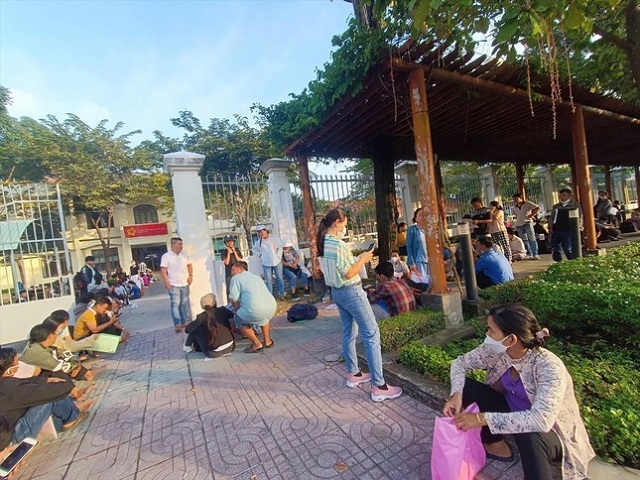Incorrect Implementation
The Institute of Resource Economics and Environment (the unit that provided comments on the construction of the 2024 Land Law) has just sent a document to the People’s Committee of Ho Chi Minh City, requesting that they direct the tax authority to strictly adhere to the provisions of Decision 79/2024 of the People’s Committee.
According to the Institute of Resource Economics and Environment, Article 3 of Decision 79 stipulates the transitional provisions: “In case the competent state agency has received the land user’s dossier before the effective date of Decision 79, the land price for calculating financial obligations and land-related taxes shall continue to be implemented according to the regulations at the time of dossier submission.”
Similarly, Article 5 regulates the organization of implementation: “The Chief of Office of the People’s Committee of Ho Chi Minh City, the Director of the Department of Natural Resources and Environment, the Director of the Department of Finance, the Chief of the Tax Department, the directors of the departments, the Chairman of the People’s Committee of Thu Duc City and the districts, the heads of agencies, units, organizations and individuals shall be responsible for executing this Decision.”

There has been inconsistency in the implementation process of the tax authority according to Decision 79 of the People’s Committee of Ho Chi Minh City.
|
This implies that the real estate dossiers of the people, including those for changing the land use purpose submitted before October 31 when Decision 79 took effect, will be calculated at the time when the competent authority received the dossier. It also implies that it will be calculated at the time when the people submitted the valid dossier. According to Decision 79, the land use fee when people change the land use purpose is applied according to the land price table in Decision 02 and according to Decision 56 on the land price adjustment coefficient (coefficient K).
In the opinion of the Institute of Resource Economics and Environment, Decision 79 stipulates the provisions very specifically and clearly in the process of directing and managing the new policies on the 2024 Land Law. However, the Institute of Resource Economics and Environment has recorded inconsistencies in the implementation process of the tax authority according to Decision 79.
Specifically, the tax authority only used 3 provisions of Decision 79, and the other 2 were not implemented but carried out according to the tax sector’s own understanding. This has led to numerous complaints and lawsuits from citizens due to incorrect land use fee calculations, with the fees being much higher than those calculated according to Decisions 02 and 56.
Specifically, at Document No. 10640 of the Ho Chi Minh City Tax Department, which guides the district-level tax departments, Item 2 states: “Regarding the time of calculating land use fees, land rent, land use purpose conversion fees, and recognition of land use rights, implement according to Clause 3, Article 155 of the 2024 Land Law and the effective date of the land price table according to Decision 79.”
This means that the time of calculating land use fees and land rent for dossiers on changing land use purposes, renting land, and recognizing land use rights (granting land use certificates for the first time) is the time when the state issues a decision allowing the change of land use purpose or when the people submit a valid dossier according to the law.
Based on this document from the Ho Chi Minh City Tax Department, the district-level tax departments calculate the land use fees for the people by keeping the coefficient K but removing the limit. The time of calculating land use fees and land rent for dossiers on changing land use purposes and renting land is also not in line with the spirit of Decision 79 of the People’s Committee of Ho Chi Minh City but is implemented according to the 2024 Land Law.
Incorrect Calculation of Land Use Fees
With a sense of responsibility as a policy critique and consistency in state management of land, especially in organizing administrative reform through one-door transactions at the district level when handling people’s dossiers and towards a city-wide inter-connected one-door transaction when receiving people’s dossiers, the Institute of Resource Economics and Environment believes that there is a discrepancy between Decision 79 of the People’s Committee and Document No. 10640 of the Ho Chi Minh City Tax Department in terms of understanding, implementation, and application.

People queue to submit land dossiers in Cu Chi before October 30. However, their dossiers may not be calculated according to the old land price table.
|
This has led to district-level tax departments miscalculating land use fees for people when applying Decisions 02 and 56 but keeping the coefficient K and removing the limit. While Decision 56 clearly stipulates that for land within the limit, the land use fee is calculated according to the land price table in Decision 02, and for land outside the limit, the coefficient K is applied. The coefficient K to be applied varies by area, ranging from 2.5 to 2.9 times.
Therefore, the Institute of Resource Economics and Environment recommends that the People’s Committee of Ho Chi Minh City direct the Tax Department to strictly adhere to the provisions of Decision 79 and the transitional provisions in Article 3 and the organization of implementation in Article 5 of Decision 79. They also recommend that the People’s Committee maintain consistency in directing the implementation of the issued decisions for departments, branches, districts, and the Tax Department in the process of deploying the new 2024 Land Law.
According to the Institute of Resource Economics and Environment, in case there are difficulties in the implementation process, they should seek guidance to make appropriate adjustments and avoid inconsistencies in the policy on handling inter-connected one-door transactions for people’s dossiers according to Decision 79.
Different Interpretations
Decision 79/2024 on amending and supplementing Decision 02/2020 of the People’s Committee of Ho Chi Minh City, which stipulates the new land price table, took effect from October 31 to December 31, 2025. With concerns about a significant increase in the upcoming land price table, leading to a considerable rise in financial obligations related to land, many people took advantage of the opportunity to complete their real estate procedures to benefit from the old land price table.
When rushing to submit their dossiers, most people expected that their dossiers, if submitted before October 31, would be subject to the old land price table. However, the implementation guidance document for Decision 79/2024 of the People’s Committee of Ho Chi Minh City, issued by the Ho Chi Minh City Tax Department to the directly subordinate tax departments, the Land-related Collections Management Office, and the Information Technology Office, contains content that is not compatible with the regulations in Decision 79 itself.
Specifically, by the end of October 30, the district-level tax departments locked the system for receiving dossiers to determine financial obligations related to land on the electronic inter-connected one-door transaction system, printed a list of the number of qualified dossiers received during the day, and signed confirmation with the Department of Natural Resources and Environment.
Regarding the time of calculating land use fees and land rent (in the case of changing the land use purpose and recognizing land use rights), the Ho Chi Minh City Tax Department will implement it according to the provisions of Clause 3, Article 155 of the 2024 Land Law and the effective date of the land price table according to Decision 79/2024 of the People’s Committee.

If interpreted according to the tax sector’s understanding, the people will be disadvantaged. |
This means that people queuing to submit dossiers at the district level and in Thu Duc City before October 31 may not have their taxes calculated according to the old land price table because their dossiers must be transferred to the tax authority, and the tax authority must have received them by October 30, as notified by the Ho Chi Minh City Tax Department. The deadline for submitting dossiers at the district-level units or departments with competent authority may not coincide with the deadline for the tax authority’s receipt of the dossiers.
Thus, there is a discrepancy in interpretation and implementation between the tax sector and other units. Specifically, the people understand that the deadline for being subject to financial obligations according to the old land price table is October 30, as long as they submit their dossiers and obtain a receipt according to Decision 79. On the other hand, the tax sector understands that the time of calculating land use fees should follow the Land Law.
If interpreted according to the tax sector’s understanding, the people will be disadvantaged. When people submit their dossiers, the one-door unit or branch office of the Land Registration Office must transfer them to the ward or commune for public notice and then conduct an on-site inspection. If there is no dispute and the on-site inspection matches the actual situation, the People’s Committee of the district will then issue a decision to allow the change of land use purpose. Only after these procedures will the case be transferred to the tax sector to calculate the financial obligations and issue a tax notice.
Mr. Nguyen Toan Thang, Director of the Department of Natural Resources and Environment of Ho Chi Minh City, affirmed that people who submit their dossiers to the receiving unit before October 31 will have their financial obligations calculated according to the old land price table. If the dossiers are submitted after October 31, the new land price table according to Decision 79/2024 will be applied. The transfer of dossiers is an internal process of state agencies.
Duy Quang
The City’s Revitalization Project: Transforming 4,000 Old Apartments into a New Residential Haven
The Ho Chi Minh City Construction Management and House Development Centre is set to renovate almost 4,000 apartments across the city, according to plans laid out by the People’s Committee of Thu Duc City and relevant districts. This large-scale refurbishment project will provide much-needed relocation accommodations for residents.
The New Math of Personal Income Tax on Land Use Transfer
The previous regulations dictated that taxable income from land-use rights transfers was determined by the transfer price of each instance. However, with the new Land Law 2024, the calculation has evolved.
Unlocking Capital for Businesses: Access up to 200 Billion VND with 0% Interest Rates
“The Ho Chi Minh City government is offering preferential loans of up to VND 200 billion per project at 0% interest to businesses with projects in the supporting industries sector. This initiative aims to boost key industries, including automation and mechanical engineering, electronics, information technology, textiles, and footwear.”



















